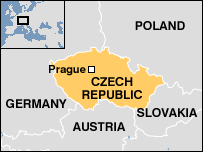Czechs soften unpopular fees for medical care
 Prague - Czech President Vaclav Klaus Tuesday sealed a law that seeks to soften direct health care fees on patients which were introduced in January as part of the government's public finance reform, Klaus' office said.
Prague - Czech President Vaclav Klaus Tuesday sealed a law that seeks to soften direct health care fees on patients which were introduced in January as part of the government's public finance reform, Klaus' office said.
The signed law abolishes charges for newborns, organ donors, nursing home residents and patients with court-ordered treatment.
Last January, Prime Minister Mirek Topolanek's center-right government had introduced a 30-koruny (1.98 dollars) fee for doctor's visits and prescriptions, 60 koruny for hospital stays and 90 koruny for emergency-room visits in a bid to rein in waste of care and medicines.
The Organization for Economic Cooperation and Development (OECD) says Czechs see their doctors more than anyone else in Europe - 13.2 visits per year, compared to the OECD average of 6.8 visits.
While the government says that the payments have already brought savings, the fees have been highly unpopular with Czechs, who had grown accustomed to free health care during the communist era.
The introduction of fees for medical care has been unpopular elsewhere in central Europe. Similar reforms were rejected in formerly-communist Hungary and Slovakia.
But the former Eastern Bloc countries Bulgaria, Latvia, Estonia and Croatia successfully introduced direct health care payments after the fall of communism in 1989, according to Bratislava-based pro-fee Health Policy Institute. (dpa)